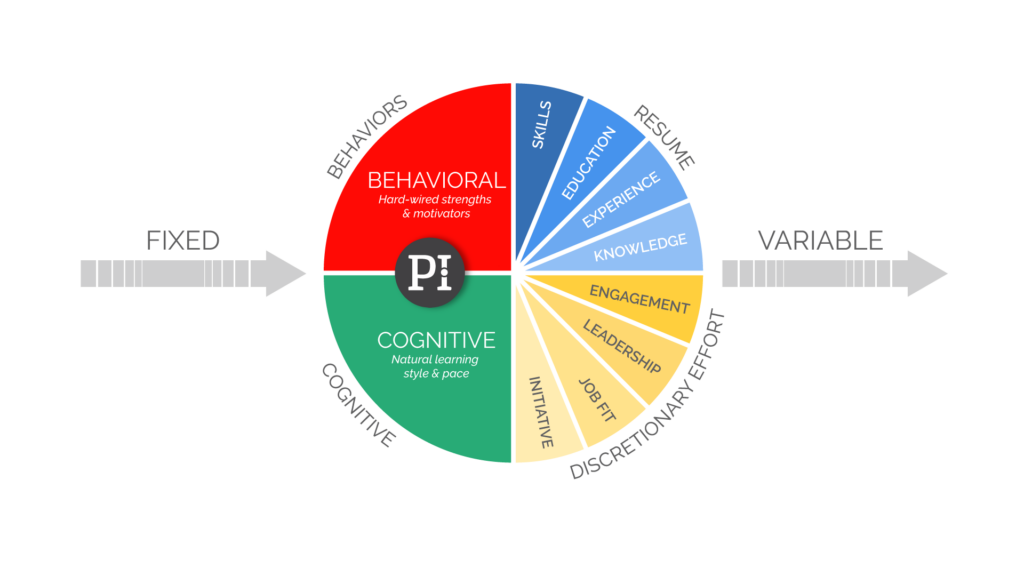
Avoid Poor Performance by Measuring Behaviors and Cognitive
What if there was a key to unlocking peak performance in your team? We all understand finding the key isn’t as easy as flipping on a switch. Achieving optimal performance requires a nuanced understanding that goes beyond conventional practices. Let’s explore how vital behavioral and cognitive factors are in predicting and maximizing individual performance.
The Building Blocks of Performance
Performance is influenced by both fixed and variable aspects. Variable aspects are things that can change over time, as a person grows and develops. Typically, variable aspects are items reported on a resume. This includes skills, knowledge, education, and experience learned on the job. While these elements are relevant to performing at work, fixed assets uncover someone’s work style and strengths (not just what they know).
Fixed aspects include inherent behaviors and cognitive abilities that stay the same over time. Behaviors means how someone takes action at work and includes natural drivers such as how much someone likes variety vs. consistency, working with others vs. working alone, and the preference for structure or freedom. Cognitive abilities refer to a person’s learning agility and knowledge acquisition speed. Understanding the relationship between fixed and variable aspects is crucial for accurately assessing performance.
Proven workplace assessments like the Predictive Index® Behavioral and Cognitive assessments can uncover the fixed aspects of your employees and candidates in minutes. Leaders can then start discussions with their team members to ensure job assignments align with employees’ natural inclinations, ultimately enhancing job satisfaction and performance. Workforce analytics tools can assist hiring managers in reflecting on inherent strengths and aligning candidates with roles more effectively.

Looking Beyond the Resume: Behavioral and Cognitive Job Fit
Have you ever hired someone who seemed like a good fit on their resume, only to have things not work out within the first year? We’ve all been there. The resume and interviews alone are not enough input to make a quality hiring decision. Why? Resumes provide a snapshot of qualifications and experiences, but they may not offer a full understanding of a candidate’s potential fit within your organization. Behavioral and cognitive assessments provide deeper insights into a person’s match with a specific role.
Let’s talk about the flip side: taking a chance on a candidate who doesn’t have a strong resume. If we are to ever overcome gender-gaps and diversity-gaps in the workplace, we need to recognize that the resume doesn’t display a candidate’s potential, only their past opportunities. In fact, meta-analysis of multiple studies reveals that pre-hire experience is a poor predictor of future performance (we’re talking less than 6% correlation). It is crucial to acknowledge that a candidate’s behavioral and cognitive traits significantly influence their ability to excel, even if their resume does not explicitly indicate it.
So, what can you do?
- During the hiring process, prioritize the evaluation of candidates’ behavioral and cognitive traits alongside their qualifications.
- Incorporate structured interviews (with behavioral assessments) to gain a holistic understanding of their potential fit within the organization.
- Create an internal benchmark of behaviors and cognitive ability needed for success in a role that will compliment the skills needed to perform.
By using data-backed tools to uncover candidates’ behavioral and cognitive abilities, your organization can make more quality hires and increase the potential for discretionary effort.
Discretionary Effort: The Power of Personal Choice
People who do really well at their jobs (high performers) make great choices and go above what’s expected. Their ability to do amazing things comes from how they naturally act and think, combined with what their jobs demands. This discretionary effort results in outstanding outcomes for your organization.
When you build a culture that focuses on what people are good at and make sure jobs fit well, people can make choices that match their strengths. Provide opportunities for employees to show how creative they are, take on extra work, and grow their skills. It’s a win-win.
Strengths: Getting the Most Out of Everyone
Positivity is always better than negativity. Rather than focusing on weaknesses, leaders can unlock higher levels of performance by leveraging individuals’ inherent strengths. While addressing areas of development is important, it is equally important to identify and nurture employees’ strengths.
Here’s how:
- Encourage employees to reflect on their strengths and identify key areas of expertise.
- Provide training for managers to learn how to coach and communicate in a positive manner, creating an environment where employees can thrive.
- Empower managers to provide opportunities and assignments that align with an employee’s individual strengths, fostering a sense of fulfillment and optimizing performance.
By leveraging individual strengths, you can create an uplifting team environment and motivate employees to higher levels of performance.
Diversity and Inclusion: Expanding the Talent Pool
To truly create an inclusive culture, organizations need to continue focusing on DEIB (Diversity, Equity, Inclusion, and Belonging). DEIB initiatives have gained popularity and momentum over the last 50 years, but achieving equitable representation for women and people of color, especially in leadership roles, remains a challenge. One of the key reasons is outdated hiring practices. We no longer live in a world where we accept paper applications in-person or just hire someone based on proximity to the workplace. As stated before, the resume is not enough. Over-reliance on resumes may hinder finding individuals with untapped potential and restrict opportunities for those with untraditional backgrounds but tremendous potential. By assessing behavioral and cognitive traits, organizations can identify talented individuals who may not have had equal opportunities to showcase their abilities.
Hiring managers can reduce unconscious bias by using behavioral and cognitive assessments in talent management practices to identify individuals with strong potential, regardless of their resume. After hiring, implement development programs and mentorship initiatives to nurture and advance these individuals within the organization.
Maximizing Workplace Performance Holistically
To maximize performance in the workplace, adopt a holistic approach that considers both fixed and variable aspects, to truly look at the whole person’s potential. By leveraging individuals’ inherent strengths, aligning roles accordingly, and recognizing the power of discretionary effort, organizations can unlock their full potential. Embracing behavioral and cognitive assessments and prioritizing diversity and inclusion efforts will help organizations tap into a broader talent pool and create a more inclusive and high-performing workplace.
Your Next Steps: Unlock Individual Potential with a Free Assessment
Curious about understanding individual performance and identifying inherent behavioral strengths and learning speed? Contact us for a free assessment – we’ll even schedule a 30-minute call to delve deeper into your results, at no charge. Ready to unlock your team’s full potential? Let’s get started.
Empower your Workforce, Amplify your Impact
Ready to take the next step? Let’s make your organization so successful you’ll feel like you just invented the wheel (again).


